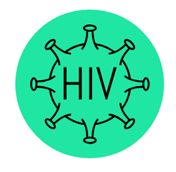Hepatitis C
Hepatitis C (HCV) is a viral infection that causes liver inflammation and damage. There is currently no vaccine for HCV, but there is treatment which can help control it. If left untreated, it can lead to scarring of the liver (cirrhosis), liver cancer, and even liver failure.
HCV is transmitted by:
-
Direct blood to blood contact
-
Infected needles or syringes
HCV is NOT spread by:
-
Shaking hands
-
Kissing
-
Coughing
-
Sneezing
-
Toilet seats
-
Sharing food/drinks
-
Mosquitos
It’s important to be cautious and stay protected from HCV. Do so by:
-
Using clean/sterile needles for medical purposes
-
Not using illegal drugs, especially if they are injected
-
Being careful about body piercings and tattoos
-
Go to a respectable shop and ask questions about how they sterilize their materials
-
Make sure they use sterile needles
-
-
Practice safe sex and always use condoms
-
Get tested for HCV
It is recommended to get tested once a year if practicing abstinence, every 6 months if you're in a monogamous relationship, and every 30 days after a new sexual partner.





